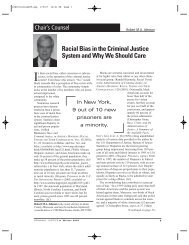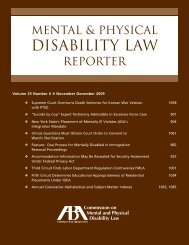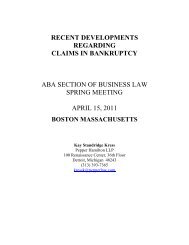Table of Contents - American Bar Association
Table of Contents - American Bar Association
Table of Contents - American Bar Association
Create successful ePaper yourself
Turn your PDF publications into a flip-book with our unique Google optimized e-Paper software.
One <strong>of</strong> the ABA’s sentencing priorities is the elimination <strong>of</strong> mandatory minimum sentencing.<br />
Congress directed the United States Sentencing Commission to prepare a report on mandatory<br />
minimums and to make recommendations. In May, the Commission held a hearing on this<br />
issue at which committee Co‐Chair Jim Felman testified. During the upcoming year, the<br />
committee plans to use the opportunities presented by the Commission’s report to advance the<br />
ABA’s existing policy regarding mandatory minimums.<br />
An additional priority <strong>of</strong> the committee has been to urge the Sentencing Commission to make<br />
greater use <strong>of</strong> alternatives to imprisonment. This past year, the Commission promulgated<br />
proposed amendments to expand alternatives and our committee submitted written comments<br />
supporting the amendment and Jim Felman testified before the Commission. The Commission,<br />
in fact, passed the amendment and it is scheduled to go into effect on November 1, 2010.<br />
In addition, the committee organized the Second Annual Sentencing Advocacy, Practice and<br />
Reform Institute with Special Focus on Reentry which was held on November 6, 2009 in<br />
Washington, D.C. The seminar featured some <strong>of</strong> the most well‐known reentry and sentencing<br />
experts in the country, such as John Jay College <strong>of</strong> Criminal Justice President Jeremy Travis and<br />
Deputy Solicitor General Michael Dreeben. The program was a success with over two hundred<br />
attendees, and the Committee will assist with the Third Annual program which will be held in<br />
conjunction with the Fall Council meeting in Washington D.C. This year’s program will include<br />
a Criminal Justice Legal Educators Colloquium.<br />
Last year, the committee provided comments and perspectives to the DOJ on its charging and<br />
sentencing practices. In May, Attorney General Holder released a memorandum outlining new<br />
charging and sentencing policies for U.S. Attorney Offices. We hope to monitor the<br />
implementation <strong>of</strong> these new policies and provide feedback to the sentencing community on the<br />
specific changes that have been brought about.<br />
Finally, the committee continues its efforts to achieve procedural reform in the federal<br />
sentencing process. The committee has developed policy which was approved by the House <strong>of</strong><br />
Delegates to amend Federal Rule <strong>of</strong> Criminal Procedure 32 to ensure that both the government<br />
and the defense have an opportunity to review the information to be considered by the<br />
sentencing court in determining the appropriate punishment. During the upcoming year, we<br />
plan to continue our efforts to encourage the Rules Committee to adopt this amendment.<br />
SPECIALIZED PRACTICE DIVISION<br />
Division Co‐Directors: Cheryl Jacobs and Bruce Zagaris<br />
Amicus Practice Committee<br />
Co‐Chairs: Terence Anderson and Rory Little<br />
Abbott v. U.S.<br />
In May 2010, the ABA filed an amicus brief supporting petitioners in Abbott v. U.S. (09‐479) and<br />
Gould v. U.S. (09‐7073), cases involving the potential « layering » <strong>of</strong> mandatory minimum<br />
sentences. The brief had been recommended by the Section and was drafted by Jeffrey Lamkin<br />
and Edward Daniels at MoloLamkin, with the assistance <strong>of</strong> Margaret Love. It may be viewed<br />
at: www.abanet.org/amicus/briefs/kevin_abbott_carlos_rashad_gould_v_united_states.pdf.<br />
Flournoy v. Georgia: While the ABA rarely files amicus briefs in state supreme courts, upon<br />
recommendation <strong>of</strong> Amicus Committee Co‐Chair Rory Little, the Executive Committee decided<br />
in May to file an application for a brief in the right‐to‐counsel case Flournoy v. Georgia that had<br />
been appealed to the Georgia Supreme Court. Last December, plaintiffs had filed a class action<br />
ABA Criminal Justice Section Annual Report 2009-2010 34







